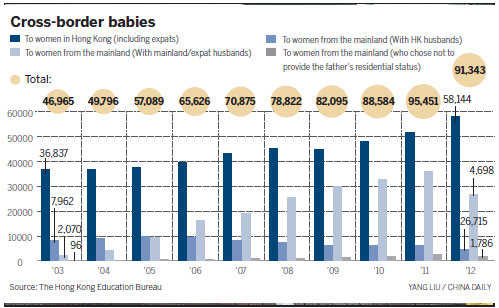
"The English lessons in Hong Kong's kindergarten are of a far higher level than those in Shenzhen's primary schools," she said, adding that linguistic skills will be an important advantage in the search forwork later in life.
Speaking with a strong northeastern accent, Pi said she doesn't understand Cantonese, the dominant language in Hong Kong, but her granddaughter speaks it "very well". Unlike many of her mainland peers, the 4-year-old attends several after school activities."So she can establish close relationships with local children," Pi said.
Zhou Jianfeng, the founder of Siyuan, an educational NGO in Shenzhen that helps cross-border students, said quality of education, rather than cost, is the main reason parents' choose to send their children to Hong Kong schools.
He said grade three, primary school students in Hong Kong have a vocabulary equal to that of students in Shenzhen's middle high schools.
Another factor is that children educated in Hong Kong have a far higher chance of being admitted to the city's universities than children at the same level who were educated on the mainland, he said.
Fundamental factors
As long as these fundamental factors remain, parents will not change their preferences, Zhou said, adding that some parents are even willing to let their children attend schools near the Hong Kong airport, about 50 minutes from the border.
Echoing Zhou, Leung said the fact that Hong Kong's education system is recognized and respected overseas, especially in countries such as the United Kingdom and Australia, is one of the biggest incentives for the long years of commuting across the border.
He said most cross-border students will eventually reside in Hong Kong, because they were born there. However, without a sustainable system to support them and provide a proper education, they may not be suited to joining the labor force, which was the primary aim of the city government when it granted permanent residence to children born to non-residents, and could even put great strain on the social welfare safety net.
As the number of cross-border students is likely to stabilize in three years time, support for them will inevitably weaken as well, he said, noting that the problem will have to be resolved by the governments of both Shenzhen and Hong Kong.
In just a few years, questions about the children's education will cease to be pertinent, but other problems will remain, such as whether there will be enough housing to accommodate them when they are ready to move to Hong Kong and if there are enough measures to keep them in the city and contribute as they are expected to.
Zhou, from Siyuan, believes that both the mainland and Hong Kong should pay more attention to the conditions in which the children live and are educated because they can play an important role in promoting integration.
Zou, whose son will start primary school in about 18 months, has already prepared for another battle ahead. When Xuanxuan started at kindergarten, she and her husband started their own jewelry company to ensure they will have more time to devote to him.
"I am considering buying a flat in the North District and cutting my working day from 70 percent to just 30 percent to prepare for my son's life at primary school," she said.


















































